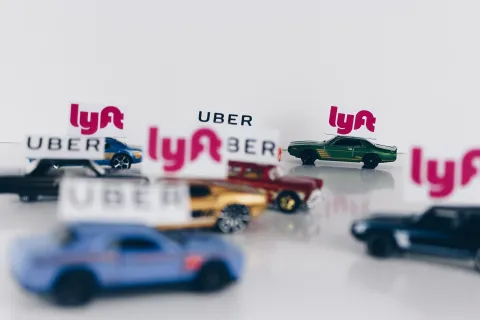Citywide ridesharing bans: Not so random after all?

It might seem counterintuitive that some cities would ban ridesharing when, from an outside perspective, it seems to widely benefit the general public and the cities themselves. Research from within the last decade has even shown that policymakers and ridesharing firms hold similar goals. Why, then, do some cities crack down so hard on ridesharing services like Lyft and Uber, while others don’t? The answer could lie in a study from our own Sukhun Kang (Department of Technology Management at UCSB), along with his co-writers Yongwook Paik (KAIST College of Business) and Robert Seamans (Stern School of Business), who found that politics can actually play a large role in the decision-making process. Ultimately, politicians who face less competition due to their tenure or established connections in the community are more likely to ban ridesharing companies than their greener and more contested counterparts.
Before going into their research, Kang, Paik, and Seamans theorized that outside factors could tip the scales in favor of banning practices that would benefit the entire population. The researchers collected data on populations in US cities that Uber entered during the period between 2011 and 2015, focusing on specific factors such as the length and experience of the mayor’s political career, the city’s size, and the city’s current unemployment. If a mayor had been in office for a while, the researchers guessed that they might be less concerned about their reputation with the general public, and instead want to cater to established local businesses like taxicab services. Bigger cities could result in a diversifying of political power through individual organizations, and higher unemployment rates could lead to offering ridesharing services as a political tool for reelection.
Kang, Paik, and Seamans found that the longer a mayor was in power, the more likely they were to ban ride sharing platforms, attesting to their hypothesis. Higher city populations and unemployment rates also raised this likelihood. And although the study didn’t definitively prove that these factors were directly leading to ridesharing bans, it did show that these bans could have little to do with the benefits or downsides of ridesharing for the city or its people. Instead, it can depend on outside factors such as city size or political election goals.
In the end, every technological advancement, business, and invention originally came from a person or group of people. And people, par to the course, have feelings, loyalty, fears, and biases. Judging the success or failure of innovation from the very limited lens of its benefits and drawbacks to the general population, or even a specific niche, can leave out the influence of outside forces, such as political barriers or situational factors that can only be noticed on closer inspection.
How you can better navigate the regulatory environment around city services
While this study focuses specifically on ride sharing in the US, it illuminates a trend that shouldn’t be ignored in broader business decisions. If political climate, city size, and unemployment rates can tangibly influence the ways in which businesses start and continue to exist in their cities, it’s essential to build considerations for these outside factors into policymaking. If you’re interested in introducing new services, technologies, or business ideas to your city, here are 3 tips to pull from this study:
- Remember to consider the political landscape. Despite their seeming distance from everyday practices like ridesharing, political tenure and community connections can heavily influence policy makers’ decisions. If you plan to bring new services to your city, ensure that you’ve kept political barriers (or benefits!) in mind.
- Stay informed about changes in your city. Monitoring political news, population size, and welfare of the general population can allow you to navigate challenges, seize opportunities, and pivot with your business idea as soon as adjustments are needed.
- Advocate for fair competition in the market. When bringing new services or technologies to your city, make sure that you’ve addressed how the old can coexist with the new, and then provide actionable steps that policymakers can take in order to see immediate results.

 Facebook
Facebook Instagram
Instagram LinkedIn
LinkedIn Twitter
Twitter